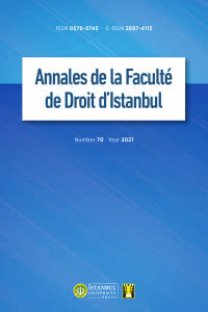Vekalet Sözleşmesini Tek Taraflı Sona Erdirme Hakkının Hukuki Niteliği ve İsimsiz Sözleşmelere Uygulanması Sorunu
Hukukumuzda vekilin, vekâlet verenin bir işini görmeyi veya işlemini yapmayı üstlendiği sözleşme ilişkileri, vekâlet sözleşmesi olarak adlandırılmaktadır (TBK m. 502). Vekâlet sözleşmesinin tanımı, kapsamı, tarafların borçları ve sona ermesi kanunumuzda açıkça düzenlenmektedir. Vekâlet sözleşmesinde kanun koyucu taraflara sözleşmeyi tek taraflı irade beyanıyla sebep göstermeksizin sona erdirme hakkı tanımaktadır (TBK m. 512). Söz konusu bu hüküm, gerek Türk Borçlar Kanunu’nun gerekse de vekâlet sözleşmesinin en bilindik ve problemli hükümlerindendir. Türk ve İsviçre hukukunda, doktrinde ve mahkeme kararlarında, bu hükme ilişkin birçok tartışma bulunmaktadır. Bu tartışmalar tek taraflı sona erdirme hakkının emredici veya düzenleyici nitelikte olup olmadığına ve bu hakkın kapsamına ilişkindir. Zamanla kanunda yer alan sözleşmeler değişen ihtiyaçları karşılamakta yetersiz kalmaktadır. Bunun bir sonucu olarak da taraflar, ihtiyaç duydukları hukuki ilişkileri sözleşme özgürlüğü kapsamında isimsiz sözleşmeler yaparak sağlamaktadırlar. Vekâlet sözleşmesi torba bir iş görme sözleşmesidir (TBK m. 502/2). Bu sebeple, vekâlet sözleşmesine ilişkin hükümlerin, niteliklerine uygun düştüğü ölçüde, isimsiz iş görme sözleşmelerine de uygulanacağı ifade edilmektedir (TBK m. 502/2). Bu çalışmada ise vekâlet sözleşmesine özgü sona erme sebebi olan tek taraflı sona erdirme hakkının hukukî niteliği ve isimsiz sözleşmelere uygulanıp uygulanmayacağı belirlenmeye çalışılmıştır.
The Nature of The Revocation Right the Agency Contract and the Question of its Application to the Innominate Contracts
In the Turkish legal system, the contractual relationship whereby the agent undertakes to conduct a particular business or provide certain services of the principal is known as an “agency contract” {Turkish Code of Obligations (TCO) art. 502}. The definition, scope, and obligations of the parties and the contract’s termination are expressly regulated in our law. Under this contract, legislators have given the parties the right to revoke with a unilateral declaration of will without reason (TCO art. 512). This provision is one of the most prominent and ambiguous provisions of both the TCO and the agency contract. It has been the topic of much discussion in legal doctrine and court decisions of Turkish and Swiss law. These debates are concerned with the scope of the revocation right and whether the right is of an imperative or regulatory nature. Provisions about contracts in the codes have proven insufficient to meet the new conditions in real life over time. For this reason, contractual parties have tried to meet their needs by concluding innominate contracts based on the principle of freedom of contract. The agency contract is general contracts for the management of another’s affairs (TCO art. 502/2). Therefore, it is noted that the provisions of the agency contract apply to an innominate contract for the management of the affairs of another, insofar as this provision is also suitable for their nature (TCO art. 502/2). This article has attempted to determine the legal nature of the revocation right, which is the specific means for termination of an agency contract, and whether it will apply to innominate contracts.
Keywords:
Revocation Right, The Agency Contract, Innominate Contract, Imperative Nature Regulatory Nature,
___
- Stöckli, Hubert “Art. 404 OR ist zwingend, was sich aber nicht immer auswirkt - Entscheid des Bundesgerichts vom 10. Februar 2009 (4A_437/2008)”, (2010), BR, Heft 4, 178-179.
- ISSN: 0578-9745
- Yayın Aralığı: Yılda 2 Sayı
- Başlangıç: 1951
- Yayıncı: İstanbul Üniversitesi
Sayıdaki Diğer Makaleler
Çevrim içi Oyun Platformlarının Gizlilik Taraması: “Gamecell” Analizi
Leyla KESER BERBER, Ayça ATABEY
“Şirket Savaşçılarının” Statü Sorununa Ilişkin Uluslararası Insancıl Hukukun Getirdiği Çözümler
Alman Hukukunda Bağlılık Raporunun (§ 312 AktG) Kısmen Açıklanması
Türkiye’de Fikri Haklar Uygulaması
Adi Ortaklığın Taraf Ehliyeti: Alman, İsviçre ve Türk Hukuku Bakımından Karşılaştırmalı Bir Çalışma
